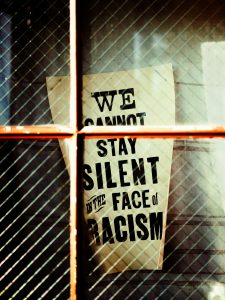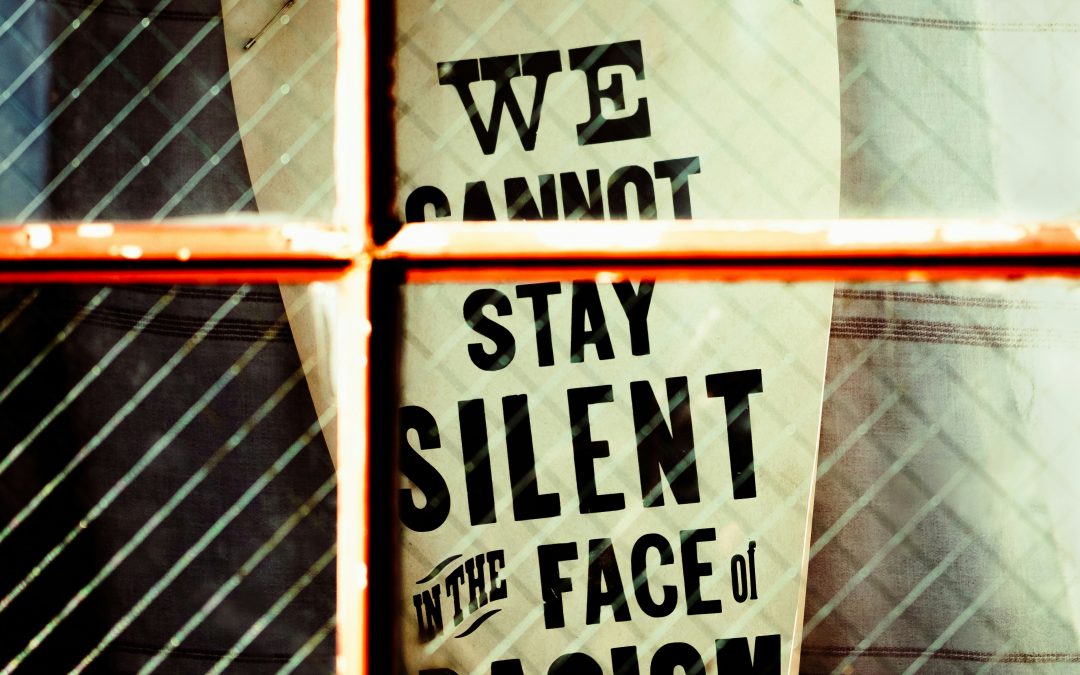LCI Faith and Racial Justice Lead Dwayne Hutchinson reflects on the urgent need for Christians to speak out against racism.
 Yes. A lot of churches and Christians across the UK are silent, whilst the loudness of racism continues to hurt the ears, hurt the eyes, and damage the feelings of all those affected.
Yes. A lot of churches and Christians across the UK are silent, whilst the loudness of racism continues to hurt the ears, hurt the eyes, and damage the feelings of all those affected.
Are you a Christian and quiet about racism? Is your church built on racist structures? Is there more our churches could be doing to challenge the racism that impacts our society?
We are in the midst of a wave of protests from the far-right whilst people seeking refuge are staying in hotels with uncertainty about what will happen to their accommodation. The hostility from these protests is having a serious impact on their health and wellbeing. Meanwhile, funding allocated for racial justice work has been cut by the Church of England. Conversations are taking place about the ways Christianity is being used to stoke the rise of the far right.
I believe it is a contradiction for Christian churches to be silent about racism. Whilst a few Christians have spoken out and remain active against racism, the majority of the church still remains silent.
Some Christian ministers and Christian leaders may say, “I don’t know what to say about racism” so they choose not to say anything. This is silence.
“Who will believe me or stand with me if I say something?” This is still silence.
“It will all die down soon.” Hold up. You never said anything in the first place to make racism ‘die down’. How do you expect racism to just die down without dismantling the racist ideologists that persist in people’s minds and actions? Your silence is damaging!
Racist ideologies do not just die down. They can remain dormant for a short while, or for many years, and then pop back up whenever there is another opportunity to blame or accuse cultures or groups of people for the problems in our society, due to misinformation and disinformation regarding immigration and people seeking asylum.
Lies are being spread that asylum seekers are taking jobs, when in fact they are legally unable to work in the UK within the first twelve months of awaiting a decision on their asylum status, and only receiving between £9.95 or £49.18 per week for basic needs. This is a key example of racist ideologies othering people who have fled their countries to be safe.
Although many asylum seekers would love to work full-time, the lies and misinformation that are spread in our communities and online fuel the fire of racist reactions before people have the chance to truly educate themselves and understand the real process of seeking asylum, and its impact on people’s wellbeing throughout the asylum process. Racist ideologies need unpacking and demolishing at the same time. They don’t just die down. That is a lie. Furthermore, some may say, “racism doesn’t exist anymore.” Now this is just loud ignorance.
By choosing to be silent about racism, we fail to offer people an alternative to their hurtful views, opinions and actions; and fail to prevent the pain it causes those they choose to offend. Take for example, the MP who was suspended for using racist language and advocating for white supremacy. Many people have been brought up in racist surroundings, who have learnt racist practices from racist systems. Dale Wallace, a Canadian man brought up believing his parents’ racist rhetoric, recognised this and wrote a reflection, stating that he was “…raised in a racist home — and it’s been a long journey to unlearn those attitudes.” If Christians remain silent, we are depriving people, throughout their lifetime, of ground-breaking opportunities to learn about what God says about challenging racism and what the Bible tell us about racism. Christians who are silent, your silence about racism needs to end. We need to get louder about teaching Christianity and challenging racism.
 In 2020, after the murder of George Floyd in America, when seeing the disparities for Black and Asian communities during the COVID-19 pandemic in the UK, Bishop Tony Parry, District Bishop of New Testament Church of God, Leeds, took a bold stand, made a video and announced, “silence can no longer be an option.” This statement still rings true today in 2025 and beyond.
In 2020, after the murder of George Floyd in America, when seeing the disparities for Black and Asian communities during the COVID-19 pandemic in the UK, Bishop Tony Parry, District Bishop of New Testament Church of God, Leeds, took a bold stand, made a video and announced, “silence can no longer be an option.” This statement still rings true today in 2025 and beyond.
Christians have made statements in the past about racism not being acceptable – but how many of us are taking consistent action to deal with racism today?
In Leeds, I am pleased to say that there are Christians, such as Bishop Arun (Bishop of Kirkstall and the Co-lead Bishop for Racial Justice in the Church of England) who remains vocal and strategic about challenging racism. Dr Ann Marie Mealey (Director of Catholic Mission at Leeds Trinity University) remains active in her faith and racial justice work, and acknowledges that silence from leaders in midst of injustices may be helpful at times but detrimental, if done incorrectly. Although we have Christian leaders remaining active, the amount of people who took stands against racism, signed documents, and made pledges to do something about it in 2020, are much lower and quieter whilst racism remains loud today.
How many more videos have I seen from Christian ministers in the UK talking about racism? Very few in comparison to 2020. How many Christians still have racist ideologies after the incidents exposed in 2020? How many Christians are shouting, debating and protesting against asylum seekers, refugees and migrants, and subconsciously or unconsciously being drawn in by racist and far-right ideologies?
Unfortunately, there are people who say they are “Christians” and still utter racism out of the same mouth we offer our praise and worship to God inside and outside of Church worship services in 2025. Talk about another contradiction.
 I wonder if, when we stay silent about racism and claim to be Christians, we think God accepts our praise and our worship. Do not be fooled. Remember, God does call out believers when we are offering worship and religious services in His name and He does not accept them (Isaiah 1:13-14). This scripture always reminds me that God does not accept all our worship and services dedicated to Him, especially when Christians are missing the point of what God sees as acceptable worship over what we consider acceptable to give Him. Furthermore, the Prophet Isaiah points out that our sins can separate us from God (Isaiah 59:2). Now, racism is a sin; this means that if we call ourselves Christians while perpetuating racism, we must be reminded that our words and actions are separating us from God.
I wonder if, when we stay silent about racism and claim to be Christians, we think God accepts our praise and our worship. Do not be fooled. Remember, God does call out believers when we are offering worship and religious services in His name and He does not accept them (Isaiah 1:13-14). This scripture always reminds me that God does not accept all our worship and services dedicated to Him, especially when Christians are missing the point of what God sees as acceptable worship over what we consider acceptable to give Him. Furthermore, the Prophet Isaiah points out that our sins can separate us from God (Isaiah 59:2). Now, racism is a sin; this means that if we call ourselves Christians while perpetuating racism, we must be reminded that our words and actions are separating us from God.
Christians, irrespective of whether we are a minister, church leader, a member of a church or not; we all need look inwardly to see what actions we can take when we hear, see or take part in racism, whether consciously or subconsciously.
You may not always know the right words to say, the right actions to take yet. But just like the Methodist Church who have decided to make racial justice one of their public priorities since 1978, or Churches Together in Britain and Ireland who have Christians developing annual resources and having ongoing racial justice conversations throughout the year, you can definitely make a start. Reach out to people in your communities from across your city and beyond, work alongside people from different ethnicities in your local churches and communities, to discern together appropriate actions to challenge racism. Take opportunities to learn more about what you can do, from books, blog posts, and resources. The more Christians who speak out to challenge racism, the better our places of worship and communities will be for people of all ethnicities, now and for generations to come. Every Christian, irrespective of their ethnicity, should be looking into what they can do to eradicate racism.
Christians, let us continue to change our ways, understand the racist structures and legacies that still exist in churches today. For example, the Church of England are starting to acknowledge and have conversations about how the church was built on slavery, and their entanglement in the transatlantic slave trade as “one of the biggest benefactors of slavery.” They are looking at what needs to be done now in terms of reparations and change. We can all learn more about the origins of our churches, whether our churches were built on slavery, how it continues to have an impact on people now, and what needs to change.
Being a Christian is not for a moment. It is normally for a lifetime. If you have made a lifetime choice to follow Jesus and His examples of how to live and engage with people, then your fight against the sin of racism must also last for a lifetime too. Let us keep fighting and challenging racism until Jesus returns.
For those of you who would like to actively engage in faith and racial justice, you are invited to attend the free Responding to Questions Against Racism event, in partnership with Churches Together In Britain and Ireland and Churches Together in England, on Monday 29th September, 6pm-9pm at the Chapeltown Community Wellbeing Hub. Join us by signing up today.

